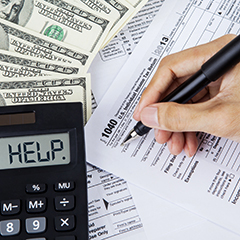The Present and Future of the Self-Employment Tax
August 25, 2014 | Accounting Standards, Business Plans
 If you’re self-employed as a sole proprietor, partner, or LLC member, you may owe the self-employment tax.
If you’re self-employed as a sole proprietor, partner, or LLC member, you may owe the self-employment tax.
This tax serves the purpose of collecting Social Security and Medicare taxes from your net self-employment income. The tax that is owed is in addition to any Federal and State income taxes. Here are the important details about the self-employment tax.
Social Security and Medicare Tax
If you’re an employee, Social Security tax comes directly out of your wages. The amount is linked to the increase in average wages, and the tax rate also changes.
All of your wages are hit with the Medicare tax of 2.9 percent. That increases to 3.8 percent for higher income levels.
In general, half of these federal employment taxes are withheld from your paychecks while the other half gets paid by your employer. However, you pay extra Medicare tax if you are a high earner, with no portion of it being covered by your employer.
Self-Employment Tax
Self-employed people must cover these two taxes combined, either in quarterly estimated tax payments or when they file their income taxes. For 2014, the maximum 15.3 percent self-employment tax rate is on your first $117,000 of self-employment income. If your income exceeds the $117,000 ceiling, additional net income will be subject to the 2.9 percent Medicare tax.
The Future of the Self-Employment Tax
What you pay in self-employment taxes is likely to increase. The Social Security tax ceiling is increasing to account for inflation, resulting in more and more of your income being taxed at the maximum 15.3 percent rate.
According to the Social Security Administration’s latest projection, the Social Security tax ceiling is expected to increase to $165,600 for 2022. That would mean a tax bill of $25,337 on self-employment net income of $165,600.
Now for the Good News
It’s not, however, all bad news. There are some positive things to consider:
- If you have a job and have Social Security tax taken out of your wages, you get credit when calculating your self-employment tax bill. This means that if you have self-employment income as well as income from your job, you still only get taxed the maximum of 15.3 percent on the first $117,000.
- Usually you can deduct 50 percent of your self-employment tax bill. The write-off is available whether you itemize or not. You cannot, however, deduct any portion of the extra 0.9 percent Medicare tax on high earners.
- You generally don’t have to pay self-employment tax on profits from selling business assets that are not considered inventory.
There are many aspects of the self-employment taxes to consider. Filler & Associates may be able to suggest some ways to lower your net self-employment income and lower your tax bill.
